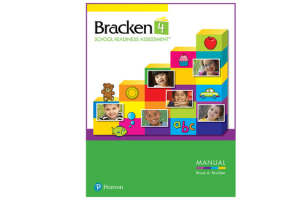The BSRA–4™ is a brief version of the Bracken Basic Concepts Scale–Fourth Edition Receptive™ (BBCS–4:R™) The six subtests on BSRA–4™ are designed to evaluate children’s school readiness in terms of their understanding of basic concepts that are strongly related to early childhood cognitive and language development as well as early academic achievement.
Age Range:
3:0 through 7:11
Administration:
Q-global®, paper-and-pencil. Trained A level examiners may administer the BSRA-4; B level professionals must score and interpret test results.
Scoring Option:
Q-global, Manual
Scores/Interpretation:
School Readiness Composite score, percentile ranks, age equivalents, descriptive classifications, and percent correct by subtest
Publication date:
2022
Completion time:
15–20 minutes
Qualification level:
B
Forms:
Record Form, Concept Development Guide
Report Options:
Q-global
The BSRA–4 is Now Available!
When can you expect the BSRA–4?
- Paper and pencil administration: Now available
- Q-global scoring and reporting: Now available
The BSRA–4 is a quick and easy child development assessment of school readiness. A brief edition of the comprehensive BBCS–4:R, the BSRA–4 assesses comprehension of the concepts strongly related to early childhood cognitive and language development, school readiness, and early school achievement: colors, letters, numbers/counting, size/comparisons, shapes, and self/social awareness. Trained A level examiners may administer the BSRA-4; B level professionals must score and interpret test results.
View the BBCS/BSRA flyer
View the Top 5 Benefits of Digital for BBCS–4:R and BSRA–4
Benefits:
- Provides highly accurate and reliable information about children’s comprehension of concepts related to academic success and classroom communication
- Requires only a pointing response—ideal for children who are shy or who have a receptive or expressive language impairment
- Offers digital and print test administration options with manual or automated scoring and reporting
- Minimizes testing time with start points and discontinue rules
- Matches assessment outcomes and classroom curriculum goals according to each state’s early childhood educational standards
- English Record Forms
- Assesses diverse populations of children with artwork that is representative of a wide variety of cultures, developmentally appropriate, and engaging
- Includes more than 150 concepts across STEM/STEAM domains
- Assess advanced concepts that can be used to identify children as candidates for Gifted and Talented programs
Features
- An expanded age range enables you to test children ages 3:0–7:11
- New full-color artwork helps maintains children’s attention and engagement during testing
- Updated nationally representative norms reflect the current US population
- The BSRA–4 Record Form allows you to compare pre- and post-test scores
- Highly reliable results are strongly correlated with intelligence and achievement measures
The following resources are available for BSRA–4:
Sample Reports
Flyer
General
What are the differences between the BBCS–3™ and BBCS–4:R?™ What about the BSRA™–3 and BSRA™–4?
The new editions of these tests include:
- Digital administration and scoring options are available on Pearson’s Q-global® platforms.
- Updated normative data based on US Census figures (2019).
- BBCS–4:R School Readiness Subtests (SRS) and Composite (SRC) scores are based on six subtests instead of five subtests. The subtest added to the SRS and SRC scores is the Self-/Social Awareness subtest, which was Subtest 7 on BBCS–3 and was not included in BSRA–3.
- Assesses more than 150 foundational science, math, and arts concepts across STEM/STEAM domains.
- Provides a measure that can be used as part of the process that helps professionals identify students for Gifted and Talented programs.
When will there be an update to the Bracken Basic Concept Scale–3: Expressive (BBCS–3:E)?
There are no updates planned for the BBCS–3:E at this time. You may continue to use the BBCS–3:E; however, remember that the BBCS–4:R and BBCS–3:E are not co-normed, so test results are not directly comparable. BBCS–4:R and BBCS–3:E are based on research samples collected in different years and with a different demographic composition.
Why is the BSRA–4 now a B level assessment?
While trained A-level practitioners may administer and score using the basal and ceiling rules, a B-level individual with training in normative test interpretation is needed to interpret and explain scores and score differences from prior administrations.
Paraprofessionals or A-level staff working under the supervision of a qualified assessment professional may administer and score, but not interpret, the BSRA–4. Paraprofessionals and A-level staff should be carefully trained and supervised and should administer and score several practice cases before attempting their first actual testing.
Test Administration
Are there significant differences in test administration?
- BBCS–4:R now has age start points and basal rules.
- The School Readiness subtests and subtests 7–10 now include age start points, basal, and discontinue rules to reduce test administration time.
Scoring
What scores are available?
- Scaled Score
- Standard Score
- Percentile Rank
- Age Equivalent
- Growth Scale Value
- Descriptive Classification
Am I able to obtain a normed score for the Self-/Social Awareness subtest separately from the SRS or SRC?
Yes.
Why aren’t separate scores available for subtests other than the Self/Social Awareness subtest on the BBCS-4:R?
Subtests 1–5 predict academic success in the traditional sense since they are based on academic subject matter. Subtest 6 also predicts academic success from a social standpoint. Therefore, if a child’s SRS/SRC score predicts poor academic success, the examiner may want to review whether it is lack of knowledge of the academic curriculum or if it is delayed development specifically in self-/social awareness only.
Technical information
Where can I find more detailed information about the test online?
A summary of the technical characteristics of the BBCS–4:R and the BSRA–4 will be posted on the product web page’s resources tab later this summer.





